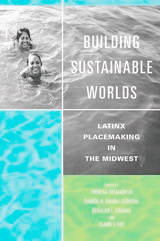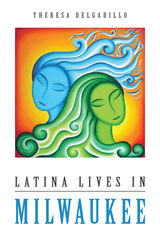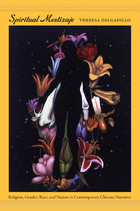4 books about Delgadillo, Theresa

Building Sustainable Worlds
Latinx Placemaking in the Midwest
Edited by Theresa Delgadillo, Ramon H. Rivera-Servera, Geraldo L. Cadava, and Claire F. Fox
University of Illinois Press, 2022
Latina/o/x places exist as both tangible physical phenomena and gatherings created and maintained by creative cultural practices. In this collection, an interdisciplinary group of contributors critically examines the many ways that varied Latina/o/x communities cohere through cultural expression. Authors consider how our embodied experiences of place, together with our histories and knowledge, inform our imagination and reimagination of our surroundings in acts of placemaking. This placemaking often considers environmental sustainability as it helps to sustain communities in the face of xenophobia and racism through cultural expression ranging from festivals to zines to sanctuary movements. It emerges not only in specific locations but as movement within and between sites; not only as part of a built environment, but also as an aesthetic practice; and not only because of efforts by cultural, political, and institutional leaders, but through mass media and countless human interactions.
A rare and crucial perspective on Latina/o/x people in the Midwest, Building Sustainable Worlds reveals how expressive culture contributes to, and sustains, a sense of place in an uncertain era.
[more]

Geographies of Relation
Diasporas and Borderlands in the Americas
Theresa Delgadillo
University of Michigan Press, 2024
Geographies of Relation offers a new lens for examining diaspora and borderlands texts and performances that considers the inseparability of race, ethnicity, and gender in imagining and enacting social change. Theresa Delgadillo crosses interdisciplinary and canonical borders to investigate the interrelationships of African-descended, Latinx and mestizx peoples through an analysis of Latin American, Latinx, and African American literature, film, and performance.
Not only does Delgadillo offer a rare extended analysis of Black Latinidades in Chicanx literature and theory, but she also considers over a century’s worth of literary, cinematic, and performative texts to support her argument about the significance of these cultural sites and overlaps. Chapters illuminate the significance of Toña La Negra in the Golden Age of Mexican cinema, reconsider feminist theorist Gloria Anzaldúa’s work in revising exclusionary Latin American ideologies of mestizaje, delve into the racial and gender frameworks Sandra Cisneros attempts to rewrite, unpack encounters between African Americans and Black Puerto Ricans in texts by James Baldwin and Marta Moreno Vega, explore the African diaspora in colonial and contemporary Peru through Daniel Alarcón’s literature and the documentary Soy Andina, and revisit the centrality of Black power in ending colonialism in Cuban narratives. Geographies of Relation demonstrates the long histories of networks and exchanges across the Americas as well as the interrelationships among Indigenous, Black, African American, mestizx, Chicanx, and Latinx peoples. It offers a compelling argument that geographies of relation are as significant as national frameworks in structuring cultural formation and change in this hemisphere.
Not only does Delgadillo offer a rare extended analysis of Black Latinidades in Chicanx literature and theory, but she also considers over a century’s worth of literary, cinematic, and performative texts to support her argument about the significance of these cultural sites and overlaps. Chapters illuminate the significance of Toña La Negra in the Golden Age of Mexican cinema, reconsider feminist theorist Gloria Anzaldúa’s work in revising exclusionary Latin American ideologies of mestizaje, delve into the racial and gender frameworks Sandra Cisneros attempts to rewrite, unpack encounters between African Americans and Black Puerto Ricans in texts by James Baldwin and Marta Moreno Vega, explore the African diaspora in colonial and contemporary Peru through Daniel Alarcón’s literature and the documentary Soy Andina, and revisit the centrality of Black power in ending colonialism in Cuban narratives. Geographies of Relation demonstrates the long histories of networks and exchanges across the Americas as well as the interrelationships among Indigenous, Black, African American, mestizx, Chicanx, and Latinx peoples. It offers a compelling argument that geographies of relation are as significant as national frameworks in structuring cultural formation and change in this hemisphere.
[more]

Latina Lives in Milwaukee
Theresa Delgadillo
University of Illinois Press, 2015
Milwaukee's small but vibrant Mexican and Mexican American community of the 1920s grew over succeeding decades to incorporate Mexican, Mexican American, Puerto Rican, Cuban, Central American, and Caribbean migration to the city. Drawing on years of interviews and collaboration with interviewees, Theresa Delgadillo offers a set of narratives that explore the fascinating family, community, work, and career experiences of Milwaukee's Latinas during this time of transformation. Through the stories of these women, Delgadillo caringly provides access to a wide variety of Latina experiences: early Mexican settlers entering careers as secretaries and entrepreneurs; Salvadoran and Puerto Rican women who sought educational opportunity in the U.S., sometimes in flight from political conflicts; Mexican women becoming leather workers and drill press operators; and second-generation Latinas entering the professional classes. These women show how members of diverse generations, ethnicities, and occupations embraced interethnic collaboration and coalition but also negotiated ethnic and racial discrimination, domestic violence, workplace hostilities, and family separations. A one-of-a-kind collection, Latina Lives in Milwaukee sheds light on the journeys undertaken then and now by Latinas in the region, and lays the foundation for the further study of the Latina experience in the Midwest. With contributions from Ramona Arsiniega, María Monreal Cameron, Daisy Cubías, Elvira Sandoval Denk, Rosemary Sandoval Le Moine, Antonia Morales, Carmen Murguia, Gloria Sandoval Rozman, Margarita Sandoval Skare, Olga Valcourt Schwartz, and Olivia Villarreal.
[more]

Spiritual Mestizaje
Religion, Gender, Race, and Nation in Contemporary Chicana Narrative
Theresa Delgadillo
Duke University Press, 2011
Gloria Anzaldúa’s narrative and theoretical innovations, particularly her concept of mestiza consciousness, have influenced critical thinking about colonialism, gender, history, language, religion, sexuality, spirituality, and subjectivity. Yet Anzaldúa’s theory of spiritual mestizaje has not been extensively studied until now. Taking up that task, Theresa Delgadillo reveals spiritual mestizaje as central to the queer feminist Chicana theorist’s life and thought, and as a critical framework for interpreting contemporary Chicana literary and visual narratives. First mentioned by Anzaldúa in her pioneering book Borderlands/La Frontera, spiritual mestizaje is a transformative process of excavating bodily memory to develop a radical, sustained critique of oppression and renew one’s relation to the sacred. Delgadillo analyzes the role of spiritual mestizaje in Anzaldúa’s work and in relation to other forms of spirituality and theories of oppression. Illuminating the ways that contemporary Chicana narratives visualize, imagine, and enact Anzaldúa’s theory and method of spiritual mestizaje, Delgadillo interprets novels, memoir, and documentaries. Her critical reading of literary and visual technologies demonstrates how Chicanas challenge normative categories of gender, sexuality, nation, and race by depicting alternative visions of spirituality.
[more]
READERS
Browse our collection.
PUBLISHERS
See BiblioVault's publisher services.
STUDENT SERVICES
Files for college accessibility offices.
UChicago Accessibility Resources
home | accessibility | search | about | contact us
BiblioVault ® 2001 - 2024
The University of Chicago Press









